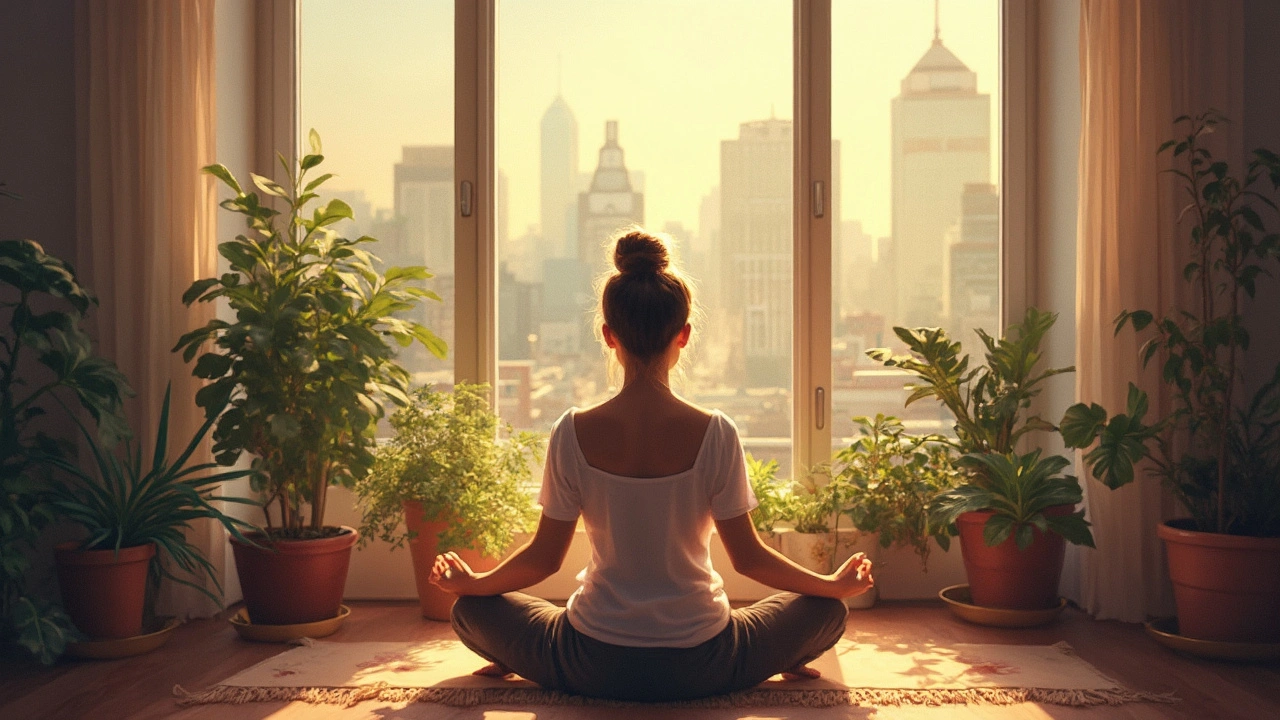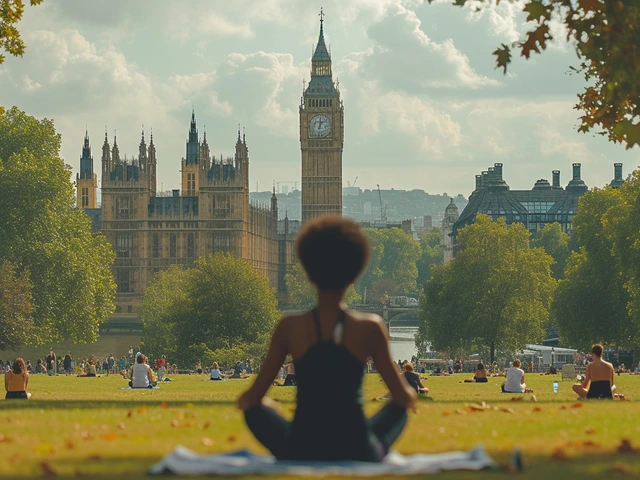
Picture this: five minutes of sitting quietly each day could leave you feeling calmer, more focused, and honestly, just better all around. That’s not hype—science has been backing this up for years now. Daily meditation isn’t just for monks or super spiritual types; regular folks doing school runs, working nine-to-fives, and juggling everyday stress are getting real results, too.
If you're tired of feeling scattered or stressed by lunchtime, meditation gives you something solid to help. You don’t have to change your entire life or buy any fancy gear. In fact, all you really need is a spot to sit, maybe a timer on your phone, and permission to take a break from the constant noise in your head.
- Why Daily Meditation Matters
- What Happens To Your Brain
- How To Start (And Stick With It)
- Upgrading Your Practice
Why Daily Meditation Matters
If you’re only meditating when you remember or when stress gets out of hand, you’re probably missing out on the good stuff. Doing meditation daily is what gets those bigger changes that actually stick around. According to a UCLA study from 2023, regular meditators showed greater resilience to everyday stress, and they reported better sleep—sometimes up to an extra hour per night compared to non-meditators. Not a bad return on just a few minutes a day.
Check out how daily meditation can change things, even if it feels like a tiny habit at first:
- It helps your mind focus—people who meditate regularly do better on memory tests and stay on task longer at work.
- Stress? It shrinks over time. Not just because you feel calm after meditating, but because your body physically reacts less to pressure.
- Your mood gets a boost. Studies show a drop in symptoms of anxiety and mild depression after only eight weeks of daily practice.
- People who meditate every day have lower blood pressure, which means a healthier heart in the long run.
The bottom line: It’s not about waiting for a crisis. By making meditation a regular thing, you shore up your mental health and even your body’s response to stress. It’s like putting small change in a savings account—over time, it adds up way more than you’d think.
| Benefit | How Fast You Notice | Study Source |
|---|---|---|
| Improved focus | 2 weeks | Harvard, 2022 |
| Less anxiety | 4-8 weeks | UCLA, 2023 |
| Better sleep | 3 weeks | Stanford, 2020 |
| Lower blood pressure | 8 weeks | Johns Hopkins, 2021 |
So if you're thinking daily meditation is just an add-on, it’s not. It’s that small move that shapes your brain and body in ways you can measure pretty quickly. Making daily meditation part of the routine puts you way ahead in managing stress, getting better focus, and feeling good day to day.
What Happens To Your Brain
Daily meditation changes your brain, and that's not just talk—it shows up on MRI scans. One key area that gets thicker with regular practice is the prefrontal cortex. This spot is responsible for focus, decision making, and self-control. If you find it hard to concentrate or hit pause on stress, this is a direct win for you.
Another part that benefits is the amygdala. That’s the bit in charge of the fight-or-flight response—basically, it fires up when you’re scared or stressed. Meditation helps shrink the amygdala over time, so you feel less on edge and don’t freak out as easily when life throws stuff your way.
Even after a few weeks of daily meditation, researchers have seen less activity in the default mode network. This network is what gets busy when your mind starts jumping between worries, to-dos, and old memories. So regular daily meditation makes it easier to stop overthinking everything and just be present.
- Memory and learning get a boost because meditation strengthens the hippocampus.
- You can actually become less reactive and more patient, thanks to changes in those stress-related circuits.
- Some studies even show more gray matter in parts of the brain linked to empathy and kindness.
This isn’t about overnight magic, but the science is clear: the more steady your meditation routine, the better your brain adapts. You’re literally training your mind to work for you, not against you.

How To Start (And Stick With It)
Starting daily meditation sounds easy, but actually keeping at it? That’s where most people stumble. Consistency is what unlocks all the real benefits, but old habits and busy days can get in the way fast.
So, where do you begin? Start super simple. Most people who meditate regularly recommend starting with just 5 minutes a day. Stepping up to 10 or 15 minutes can come later, but that first streak of short sessions is what sets the groundwork.
- Pick a specific time and place. Mornings just after waking up, or evenings right before bed work best for most folks.
- Find a comfy seat. Don’t overthink it—couch, bed, or even the floor with a cushion works.
- Set a timer on your phone. Even free apps like Insight Timer or Headspace have built-in reminders.
- Go for guided audio first if you’re not sure what to do. There’s no rule that says you have to figure it out solo. Calm voices leading you through each step make a big difference at the start.
Accountability keeps you going. Marking sessions on a wall calendar, texting a friend, or even using a meditation streak tracker can motivate you way more than you’d expect. In a 2023 report from the American Psychological Association, people who tracked their routines were 67% more likely to stick with habits over one month.
| Trick | Why It Works |
|---|---|
| Make it part of another habit (like coffee or teeth brushing) | It stacks meditation onto something you already do, so you’re less likely to forget. |
| Start with super short sessions | Five minutes feels easy, so there’s less chance you’ll bail early. |
| Use an app for reminders | Push notifications take away the mental load of remembering. |
| Track your progress | Seeing a streak or checkmarks gives small wins that keep you going. |
If you miss a day? Don’t sweat it. Just jump back in the next day. The goal with daily meditation isn’t perfection—it’s about steady progress. You’ll notice the difference more in how you handle stress, sleep, and the crazy pace of life than in any milestone on your calendar.
Upgrading Your Practice
So you’ve been meditating for a bit and want to level up? There’s a lot you can do beyond sitting still with your eyes closed. Even small changes can seriously boost your results.
First thing’s first: mix up your technique. While basic breath awareness is a solid start, trying different methods—like body scans, guided meditations, gratitude practices, or even walking meditation—can keep things fresh and tackle different stress points. For example, gratitude meditation is linked with a noticeable bump in overall happiness, and body scan can help tame nighttime anxiety.
- Daily meditation works better when you stay flexible. Routines are great, but don’t be afraid to change it up when sessions feel stale.
- Many mindfulness apps now track your progress, offer variety, and let you join live sessions or group meditations. Folks who use tracking tools are more likely to stick with the habit.
- If you’ve hit a wall in how deep you focus, consider meditating a little longer: a study published in JAMA Internal Medicine found that 30 minutes daily reduced anxiety and depression symptoms more than shorter sessions.
- Try themed sessions. Focusing on topics like kindness, patience, or letting go can connect better with what’s happening in your day-to-day life.
Bringing friends or family along makes it easier, too. Meditation groups—online or in person—offer more accountability and support. Even a weekly check-in with a buddy can keep you on track.
| Change Noticed | Percent of People |
|---|---|
| Less stress | 65% |
| Better focus | 50% |
| Improved sleep | 45% |
| Feeling happier | 52% |
If your brain just won’t settle down, remind yourself that getting distracted is part of the process—not a sign you’re doing it wrong. The real upgrade is learning to notice when your mind wanders and gently bringing it back, again and again. Progress sneaks up on you after weeks or months, not days. Stick with it—small daily wins add up faster than you think.





